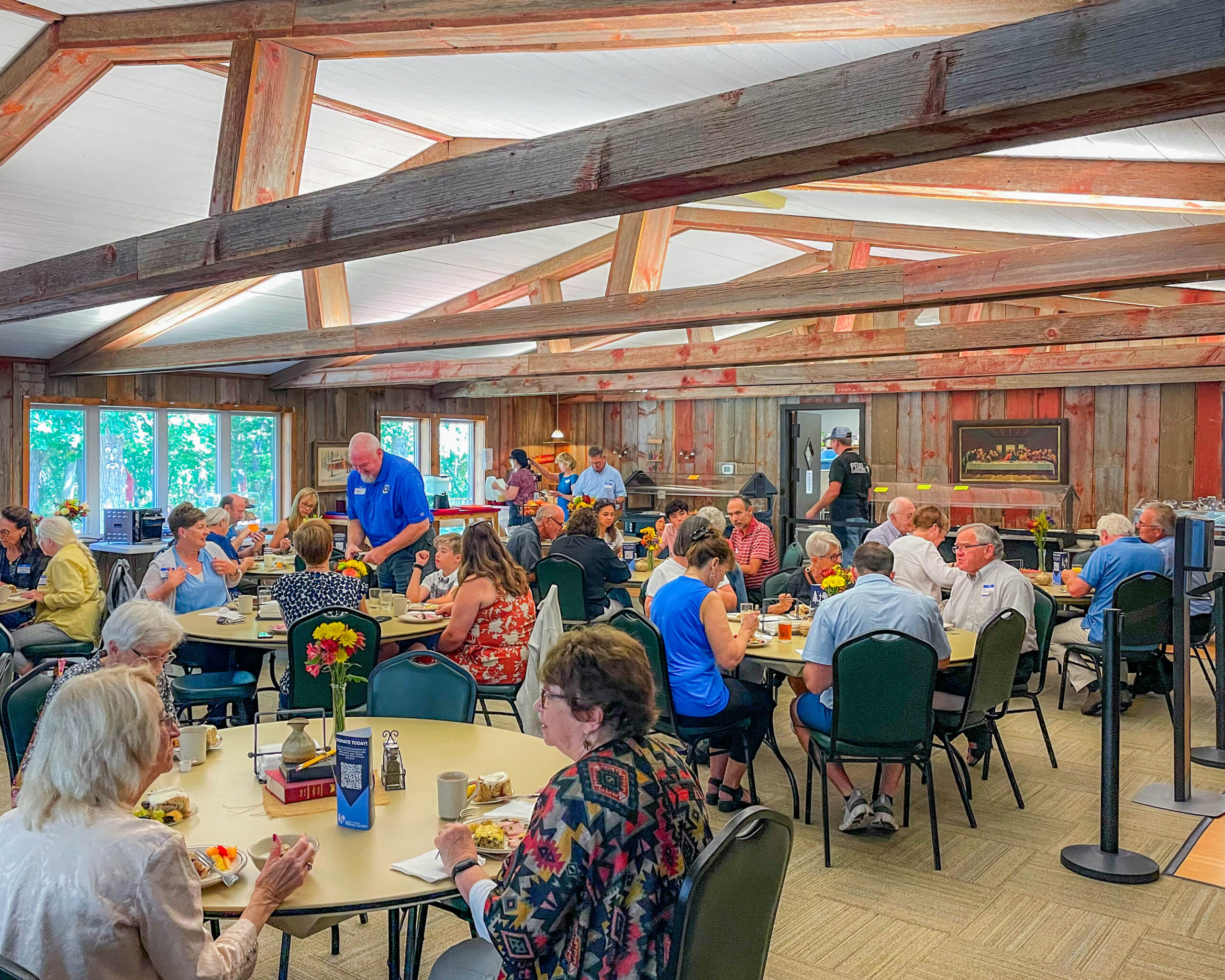Past retreatants, priests, employees and volunteers gathered by the peaceful woods and rolling hills surrounding Camp Wakonda, outside of Griswold, Iowa to celebrate 30 years of the Creighton University Retreat Center (CURC).
“Today, we are celebrating this very sacred space… we know that it is here because of the vision, the work, the donation, the art and the love of so many who have brought themselves here,” Kathy Kemler, the director of the CURC, said.
About 60people attended. The Rev. Bob Dufford, S.J., the CURC Chaplain, started off the celebrationwithCatholic Mass in the St. Kateri Chapel.As the chapel filled with guests, Dufford joked that there were so many people that he would have to take a collection.
Brunch followed, which included the CURC’s famous cinnamon rolls.
The Rev. Dan Krettek, former pastor of the CURC, and Susan Naatz, the recently retired Ignatian Director at Creighton University, spoke after brunch of the lessons they have learned from their involvement with the center. The microphone was then opened to anyone else wishing to share their experiences.
“Come as you are” seemed to become the unofficial theme of the day, with the phrase echoed in almost every speech.
Dufford spoke about the various ways people approach retreats and how God touches them in different capacities.
According to Kemler, the spirit felt is a result of the thousands of people who have been here before.
“That is really what people leave as gift when they come here,” she said to the crowd.“They bring their joys, their sorrows, their tears, their prayers, their hopes and their dreams...They come in community, and they come in solitude, all to be present to God and to open themselves and let God be present. And each person that comes has shaped this place.”
Terri Lou Duggan, the office administrator at the CURC, agreed.
“There’s bits and pieces around here from people’s experiences,” she said. “The drawings in the gift shop up on the shelf–that was a couple from Singapore…. There’s books on the shelves from people who did retreat time in the days of Father Wingert, and after, they wrotebooks about it to help others.”
The retreat center has roots going back to 1948. The Boy Scouts, who owned the land, built the original scout’s lodge, which still stands today.Camp Wakonda, as it was called, hosted approximately 2,000 Boy Scouts every year.
In 1978, the Rev. LaVern Wingert from the Dioceses of Des Moines bought the land as a retreat space. The existing cabins and chapel were constructed throughout the 1980s.
Wingert startedthe retreat center to give people a space to experience God outside of traditional Sunday Mass.
“Many times, an individual needs to escape from it all for a while. To really give himself or herself time to think, to pray, and to listen to the inspirations of the Holy Spirit more personally and directly,” wrote Wingert in a letter, read by Krettek.
Creighton purchased the buildings and 153 wooded acres from Wingert in 1994, on the condition that the property would still function as a retreat space.For the last 30 years, it has.According to Duggan,there are retreats every weekend except those of Easter and Christmas, and they often also occur during the week.
According to the Creighton website, the retreat center hosts over 6,400 guests and serves over 17,000 meals every year.Currently, the retreat center holds103beds, and 70 sleeping bags can fit in the main lodge.
Creighton has completed several updates in the last 30 years, including landscaping and adding solar panels and several sculptures, but Wingert’s mission remains.
Isabella Muzio, a student in the School of Occupational Therapy, has been on four retreats at the CURC. Each retreat, she said, has met her at a different stage in her college journey.
“I feel [that] in college, you change so much every semester, and it just is such a sense of peace and growth…[to] see how far I’ve come since freshman year.But it’s still the same places that are giving me peace,” Muzio said.
Michelle Bogard, Assistant Vice Provost for Student Life, believes the center’s impact is heightened by its quiet seclusion.
“We’re anurban campus, and this is a place where we can literally find God in all things, including nature... It’s a place that allows us to have the best of both worlds:be at an urban campus…and alsohave the opportunity to be slower and more reflective in an amazing rural community,”Bogard said.
Muzio said her biggest gift received from the retreat center is the friendships that she has taken back to Omaha.
“Everyone should go on a retreat if they can,” Muzio said.
